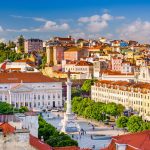Energy transition today means energy security and independence
The President of the Portuguese Association of Renewable Energies (APREN), Pedro Amaral Jorge said energy transition is essential for Portugal’s energy security and independence.
Speaking on 18 May at the first of three breakfast debates organised by the American Chamber of Commerce in Portugal (AmCham) on ‘Energy Transition in Companies’ which was sponsored by Veolia, the keynote speaker said: “Energy Transition is now no longer just an issue of the environment. It is now a vital strategy which assures our energy security and independence”.
Introducing the debate, the President of AmCham, António Martins da Costa – who since 2006 is an executive member of the board of directors at Portugal’s energy giant EDP and was chairman and CEO of Horizon Wind Energy in the US – said the road to energy transition had arrived and was now actually taking place.
“It was actually happening even before the Russian invasion of Ukraine, with a whole roadmap being mapped out towards decarbonisation, particularly for the energy sector, with more electrification and power storage. All of these aspects were on the table and have been being developed for some time”, he said.
The AmCham explained that the issue of economic slowdown resulting from the Covid-19 pandemic, and subsequent economic recovery, now put at risk with the war in Ukraine has “put other pressures on the table” with three variables coming into play: 1) ensuring energy supply; 2) fuel costs; 3) meeting EU decarbonisation targets.
Ambitious EU targets
Between 1990 and 2019, greenhouse gas emissions fell by 1% per year. This accelerated to almost 2% per year between 2007 and 2019. The 2030 target requires that the rate of decarbonisation doubles again, to almost 4% per year. The 2050 target is more ambitious still.
The EU adopted a 55% net emissions reduction target by 2030, which takes into account carbon removals from forestry activities — this will affect two of Portugal’s companies involved in paper production – Renova and The Navigator Company. This target paves the way for achieving climate neutrality in the EU by 2050.
António Martins da Costa pointed out that: “These three targets have to be worked together and not in isolation” and there are “various ways of reaching carbon neutrality”. (Nevertheless, electrification using renewables will not be the single option for all and at all times as was understood following a severe drought this summer which saw energy production from hydroelectric power (dams) plummeting in Portugal due to lack of rainfall.)
REPowerEU
Pedro Amaral Jorge said that Portugal’s measures to meet the REPowerEU plan presented to Brussels by APREN was decisive in achieving Portugal’s energy self-sufficiency and decarbonisation goals by 2030. Here, the government is investing in renewable energies (solar, wind, biomass, and hydric) and green hydrogen which will not only help meet this EU targets, but will assist Portugal in coping with the energy crisis.
REPowerEU was designed by the European Commission in response to the hardships and global energy disruption caused by Russia’s invasion of Ukraine in a bid to reduce the western world’s reliance on Russia fossil fuels.
It is backed by financial and legal measures to build the new energy infrastructure and system that Europe needs.
“Speeding up renewable energy consumption is the only way to ensure energy independence and security of supply, while at the same time contributing towards slowing climate change”, said the APREN president.
The APREN’s Pedro Amaral Jorge emphasises that the new strategy will “remove barriers that were slowing the advance and expansion of solar parks and windfarms, since new laws applicable in Portugal will prioritise the principles that the installation of renewable projects such as centralised electro-production and distribution centres, electrolyzers, energy storage systems, and even electricity infrastructure networks will be projects of public and therefore national interest”.
Furthermore, the European Commission proposes to “simplify processes and shorten licensing times in areas indicated by Member States as preferential for renewables”, says the association.
The time has come to be a Green as Sporting
Pedro Amaral Jorge explains that the measures proposed will put an end to dependence on Russian fossil fuels “which has been weaponised and costs European taxpayers around €100,000 million per year, while at the same time contributing towards climate change”.
“Renewables are a undeniable fact, it is no longer just about the environment, it is a question now of economic competitiveness, Member States controlling their sources of energy as a result of the events on 24 February (Ukraine invasion). “In football, as in energy, I am totally green”, joked the APREN president, referring to the brand colours of one of Portugal’s most famous football clubs Sporting FC.
Discussing APREN’s policy on the electrical energy mix “between January and April we are incorporating a monthly renewable component in electricity production, although this year the renewables component was lower because of the drought and its effect on hydroelectric power generation”.
The Government in fact suspended electricity production at 5 EDP dams, three in the north of Portugal and two at Zêzere, while the Bravura dam in the Algarve stopped supplying water for agricultural purposes. Energy from dams was down by -2.6 TWh. (38% of all Portugal’s electrical energy production in 2021 came from hydroelectric power stations)
However, “In terms of renewable energy production, Portugal has reasons to be proud compared to other European countries we are in 4th place,” he said.
In fact, between January and April 2022 14, 677 GWh of electricity were generated in Continental Portugal, from which 59.4 % came from renewable sources.
“If we had not be subject to the troika in 2011 which resulted in a freeze in investment between 2012 and 2017, we would have been in 2nd or 3rd place in Europe today thanks to solar and wind energy projects”, added Pedro Jorge Amaral.
However, the APREN president said he doubted nuclear energy could be part of the solution to Portugal’s energy dependence problems because it cost more in countries like France which use nuclear power (April 2022) than power generation does on the Iberian peninsula. It has so far been rejected by the Government as too costly and risky to develop in Portugal.
In the second part of the event, which was a round table discussion moderated by José Costa Pereira – Director of Energy at Veolia Portugal, with panelists Nuno Santos (Executive board member of The Navigator Company where he is in charge of energy, João Andrade Tavares (CEO of Renova) and Rita Ribeiro (EHS&eEnergy Supervisor at Hanon Systems Portugal, the panelists shared their companies’ experiences of energy transition, the technologies and processes used, and their perspectives on the future.
José Costa Pereira, Director of Energy at Veolia Portugal introduced three important industrial companies in Portugal, all of them intensive energy consumers, all of which are apprehensive about the challenges arising from huge energy costs over the past year, made even worse by the war in Ukraine, not to mention the EU’s Green Deal. (The main aim of the European Green Deal is to become climate neutral by the year of 2050. The reasons pushing for the plan’s creation are based upon the environmental issues such as climate change, a loss of biodiversity, ozone depletion, water pollution, urban stress, waste production and more)
But the mix involved in energy transition means many things, including energy efficiency and green hydrogen. From all the panoply of solutions for energy transition what is each company doing and what is their main foci?
Costs passed on to consumers
João Andrade Tavares, CEO of Renova, who heads Energy at the company, pointed out that Renova has been concerned about environmental issues for many years, particularly recycling of fibres, while trying to minimise the impact of the company on the environment.
“Today we are also concerned with energy questions and reducing our carbon footprint, it’s very important for us and in recent years we have undertaken a thorough work of improving energy efficiency at our factories, including introducing solar panels fairly recently for own-consumption, with 4MW installed, with plans to double this over the next few years”.
“This is important to reduce our costs and for reducing the company’s carbon footprint” he said, but warned that the increased costs from energy transition would be “passed on to consumers”.
João Andrade Tavares also mentioned the challenge of making energy consumption more flexible, because the prices and variations are so great, that it is extremely important to be able to select the best energy source at any given moment to be a able to be as energy efficient as possible.
Rita Ribeiro, EHS & Energy Supervisor at Hanon Systems Portugal, pointed out that the issue was on the agenda for all companies, not just energy intensive ones, but would be positive. “The main challenges we have right now is adapting technology for some more specific processes, while ensuring that the product is not compromised”, she said.
“I am referring to changing from gas to electricity and some sources and must be analysed very carefully. The other challenge is changing our investment strategy. Over the years we have worked on energy science and we have managed to implement many projects on changes in technology and processes, but always within a financial strategy or payback that was fairly profitable in order for the board to approve them”, she added.
“Now this strategy has to change, since decarbonisation technology doesn’t aways have an attractive payback over seven or eight years. So now, our top management will have to alter its strategy,” stressed Rita Ribeiro.
Nuno Santos, Executive board member at The Navigator Company, who heads the companies tissue sales and energy, pointed put that while the company was a paper and paper past producing company, it also produced biomass as a bi-product of its eucalyptus forests, producing around 5% of Portugal’s total energy requirements which is the “only energy that is not produced at a zero variable cost” since biomass is increasingly more expensive. “We produce around 33% of all biomass energy in Portugal”.
As to challenges, “Our route to carbon neutrality is very ambitious. We will reduce our emissions by 90% to 2035 by investing more in biomass boilers, while using less natural gas and other fuels that we currently use on a daily basis.
“We also have another very significant challenge associated to self-consumption and the installation of technology for self-consumption. We have 7MW of solar panels at our factories, but we will have 32. We have a significant road to travel regarding decarbonisation, but we think we’ll get there by 2035”, said Nuno Santos
The Navigator Company is also investing in Cogeneration which consists of simultaneously producing electrical power and heat, in order to increase the overall efficiency of energy production.
A second panel involved a presentation ‘Energy Transition: Solutions’ by Rui Borges (Director of Energy Production and Business Development Industry at Veolia Portugal and a presentation on Financial Grants and other Incentives for Transition and Rules by Carla Gonçalves and Catarina Matias of Finpartner.
The event was wound up with a question and answer session with the President of APREN.
The Navigator Company
Portugal ’s paper and paper paste manufacturing giant is a leading operator in the renewable energy sector as Portugal’s main producer of green energy from biomass. Board member Nuno Santos who heads the company’s renewable energy subsidiary said biomass enabled the company to be self-sufficient and to generate surplus power that it feeds into the national grid.
In fact, the company says it has made a significant contribution to energy production with over 50% of all power generated in Portugal resulting from biomass produced by The Navigator Company and around 5% of all power generated from all sources produced by the company.
The energy generated at the company’s three industrial sites is produced in two distinct ways:
– Electricity generated at biomass co-generation plants (CHP) and natural gas co-generation plants: these facilities produce both electricity and heat, and this thermal energy is used in its entirety in manufacturing processes for pulp and paper.
– Electricity generated by biomass power stations: these produce electricity only. Their other defining feature is that 100% of the power produced is fed into the national grid.
Thermal energy
Thermal energy (heat) is fundamental in the cellulose and paper industry, and more energy is used in this form than as electricity.
The quest for higher levels of energy efficiency is one of the Company’s fundamental aims. This has led it to invest continuously in rationalising energy use in the production process.
This capital investment, reflected in the energy rationalisation plans, has made it possible to cut overall energy consumption by the Company.
Co-generation
The biomass used to generate electricity at The Navigator Company’s three industrial sites is derived from by-products and waste from the raw material used in the production process:
– Waste from debarking timber and from forestry operations: sawdust and woodchip screening residues.
– Black liquor — by-product from the cooking of wood.
In addition to this biomass, the Company purchases forest waste biomass on the market, principally for the two biomass power stations at the Cacia and Setúbal industrial sites, to complement the Company’s total biomass needs.
All power generated at the Company’s industrial units is produced, whenever possible, on a co-generation basis. Cogeneration consists of simultaneously producing electrical power and heat, in order to increase the overall efficiency of energy production.
Renova
A major producer of soft tissue products and famous for launching ‘the sexiest paper on earth’
Renova has a sustainable line of hygiene tissues called Renova Green which are ecological products that are 100% bio and recyclable. Its paper is made of biodegradable tissue which takes three to six months to decompose in landfill. Paper collected at Eco points is sent for sifting and if qualified for recycling is turned into new paper.
Hanon Systems Portugal
Designs and manufactures automotive compressors and is a growing business in the electric vehicle segment. The Palmela plant is located in the Setúbal District, about 25 km (16 miles) south of Lisbon. It opened in 1998 producing mechanical scroll compressors for Ford Motor Co., and became part of Visteon Corp. in 2000. The Portuguese entity changed its name in 2015, shortly after the Korea-based parent company became Hanon Systems, which followed Visteon’s sale of its climate business to an affiliate of Hahn & Company. In 2018 it celebrated its 20th anniversary in Portugal.
Veolia
This Aveiro based company which was founded in 1992 operates in the areas of water management, residuals, and energy with solutions adapted to meet the needs of its clients: industrial, cities and the specialised tertiary sector. In energy, for example, it provides solutions and services supporting efficient energy management and low pollution energy production, balancing the needs of clients with improving the environmental impact whole keeping energy bills down.
Finipartner
An accounting and tax compliance company which offers a raft of services and consultancy on Portuguese government grants and incentives via the Portuguese Recovery and Resilience Programme (RRP) for companies that now want to improve the energy efficiency of their processes.
ARTICLE BEING UPDATED










